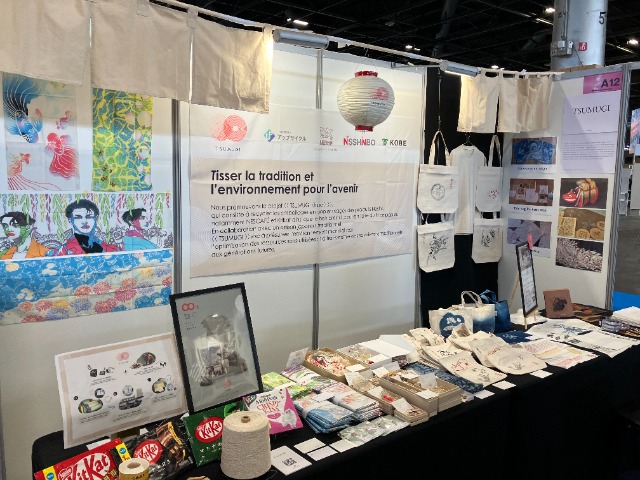Basic Concept
The Nisshinbo Group's Business Conduct Guidelines include Awareness and Concern towards its environmental impact. The Group is committed to promoting recycling and other activities with a view to improving the quality of resource recycling, and faithfully realizing a safe and secure society for all people.
【Main measures】
- ① Proper disposal of industrial waste through ISO 14001 activities while ensuring proper waste disposal governance
- ② Reduce waste emissions by promoting the 3Rs (Reduce*1, Reuse*2, Recycle*3)
- ③ Promoting reuse and reduction of packaging materials used
- ④ Selection and consignment of outstanding waste recycling companies and activities to promote the recycling and reuse of waste at overseas sites where the conditions for waste treatment differ
*1 Reduce: Reduce waste by using items carefully
*2 Reuse: Use repeatedly what is available.
*3 Recycle: Reuse garbage as a resource.
Please refer to "Promotion System" in "Environmental Management" for the promotion system.
Specific Initiatives of The Nisshinbo Group
Assessment of the 5th Three-Year Environmental Targets (to be achieved by FY2024)
The Nisshinbo Group established the 5th Three-Year Environmental Goals (5th Sustainability Promotion Plan) with the fiscal year ending FY2024 as the target year, setting the promotion of environmental management as a priority activity and establishing the following KPIs to promote improvement of recycling rate.
Improvement of recycling rate: Increase the recycling rate to 90% or more.
As a result of systematic measures to manage reductions through the PDCA cycle, the Group's recycling rate in FY2024 was 92%. This was mainly due to the transfer of the TMD Group, a consolidated subsidiary, which had a low recycling rate.
Assessment of the 6th Three-Year Environmental Targets (to be achieved by FY2027)
In the 6th Three-Year Environmental Targets (6th Sustainability Promotion Plan) with FY2027 as the target year, we raised the KPI values based on the initiatives of the 5th term as milestones for achieving the medium-term environmental targets.
Improvement of recycling rate: Increase the recycling rate to 93% or more.
Please refer to "Environmental Management" for details regarding of the "3-Year Environmental Targets."
Please refer to "Sustainability Promotion Plan and KPIs" for details regarding of the "Sustainability Promotion Plan."
Volume of Waste Generated
The Nisshinbo Group generated (including recycled waste) 31.1 thousand tons of waste in FY2024, a significant decrease of 41% from the previous fiscal year. The amount of waste generated per unit of sales was 0.063 t/million yen, a significant decrease of 36% from the previous fiscal year. Decreased due to the transfer of TMD Group, which was a consolidated subsidiary.
The Nisshinbo Group recycling rate of FY2024 was 92% (an increase of 4% recycling rate in the previous fiscal year). The recycling rate improved as a result of the transfer of the TMD Group, which was a subsidiary engaged in the Automobile Brakes business.
Trends in the Volume of Waste Generated and Volume of Waste Generated per Unit of Sales
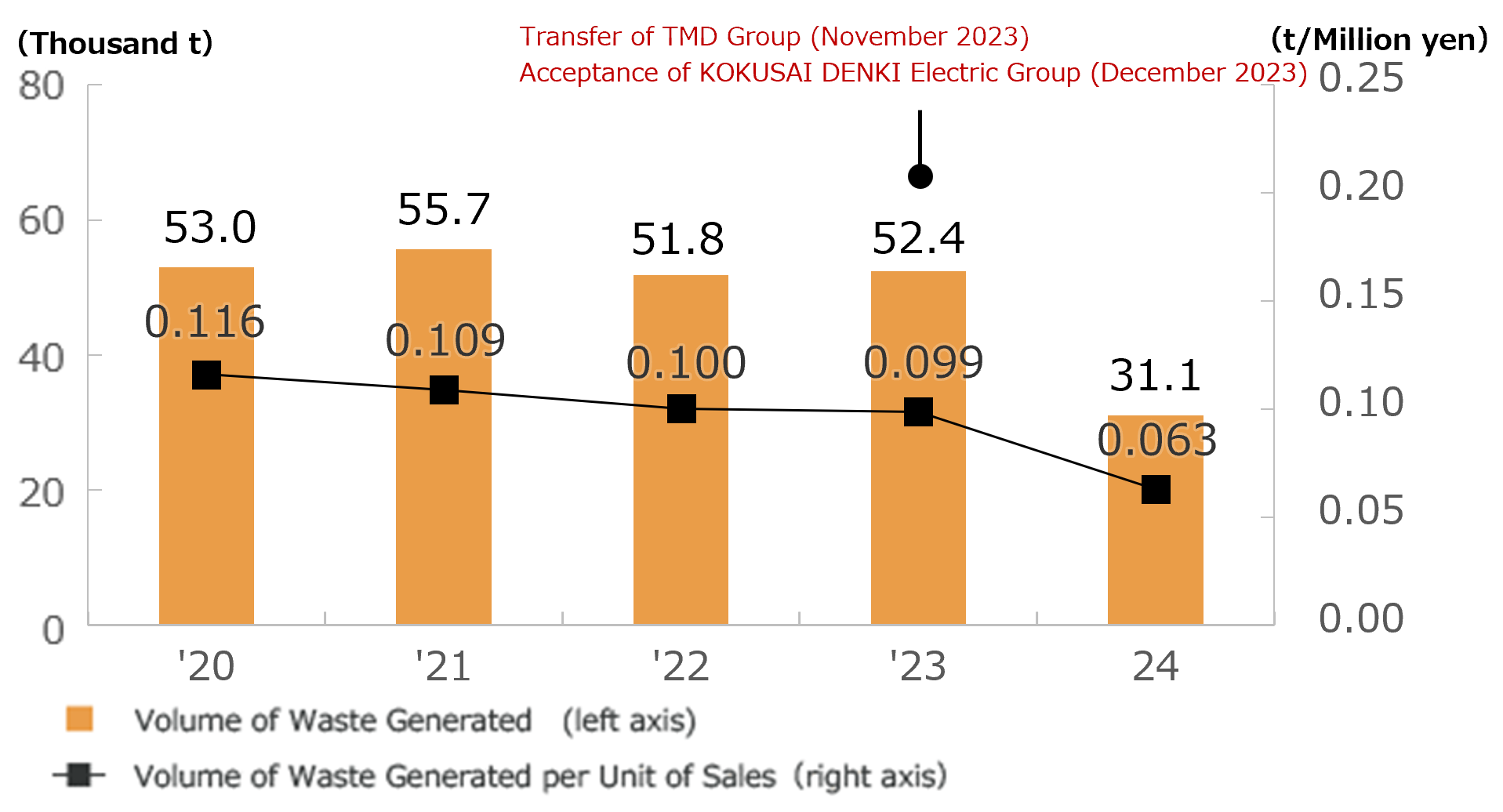
*1 Nisshinbo Holdings Inc. (the "Company") excluded TMD Group, which was a consolidated subsidiary, from the scope of consolidation, due to its transfer, which took place on November 30, 2023. As a result, data for TMD Group is included in the aggregation up to November 2023.
*2 On December 27, 2023, the Company included KOKUSAI DENKI Electric Group within its scope of consolidation, and data for the group is included from FY2024.
*3 On November 28, 2024, the Company included ARGONICS GmbH and ARGONAV GmbH within the scope of consolidation as subsidiaries in the Wireless and Communications business. However, data for these companies is not included in the FY2024 data.
Trends in the Recycling Volume and Recycling Rates
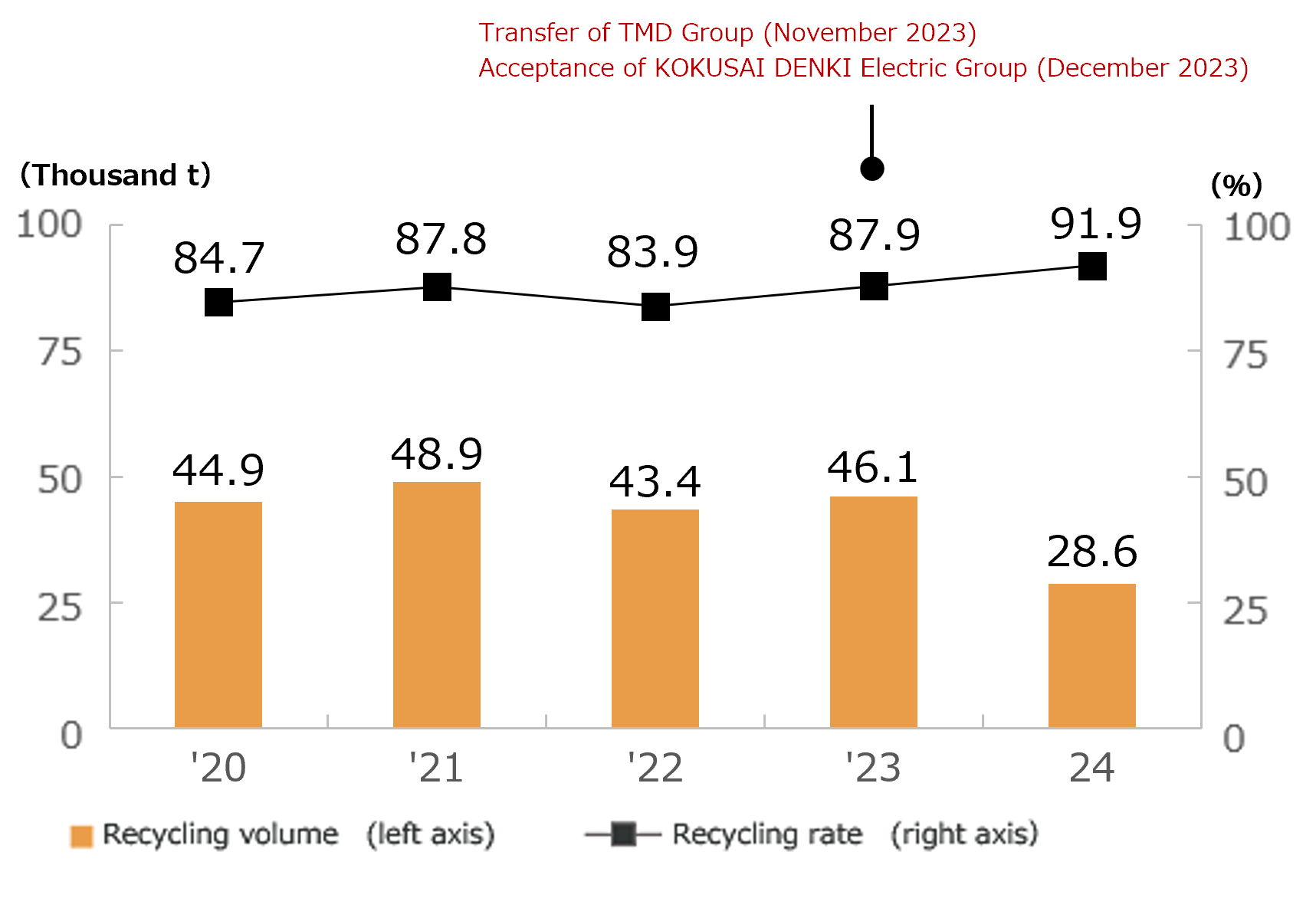
*1 Nisshinbo Holdings Inc. (the "Company") excluded TMD Group, which was a consolidated subsidiary, from the scope of consolidation, due to its transfer, which took place on November 30, 2023. As a result, data for TMD Group is included in the aggregation up to November 2023.
*2 On December 27, 2023, the Company included KOKUSAI DENKI Electric Group within its scope of consolidation, and data for the group is included from FY2024.
*3 On November 28, 2024, the Company included ARGONICS GmbH and ARGONAV GmbH within the scope of consolidation as subsidiaries in the Wireless and Communications business. However, data for these companies is not included in the FY2024 data.
Trends in Volume of Waste Generated by Business and Recycling Rate by Business
The Nisshinbo Group has set the target of achieving a 95 % recycling rate by FY2030. To this end, The Group is engaging in initiatives to reduce the amount of waste generated by each business.
Waste generated by business segment (including recycled waste) accounts for 36% of the total for the Precision Instruments business of which 96% is recycled.
In terms of recycling rates by business, the treatment of the abrasive powder from brake friction material at overseas sites in the Automobile Brakes business is an issue, and reuse methods and recycling destinations are being investigated.
Trends in Volume of Waste Generated by Business and Recycling Rate by Business
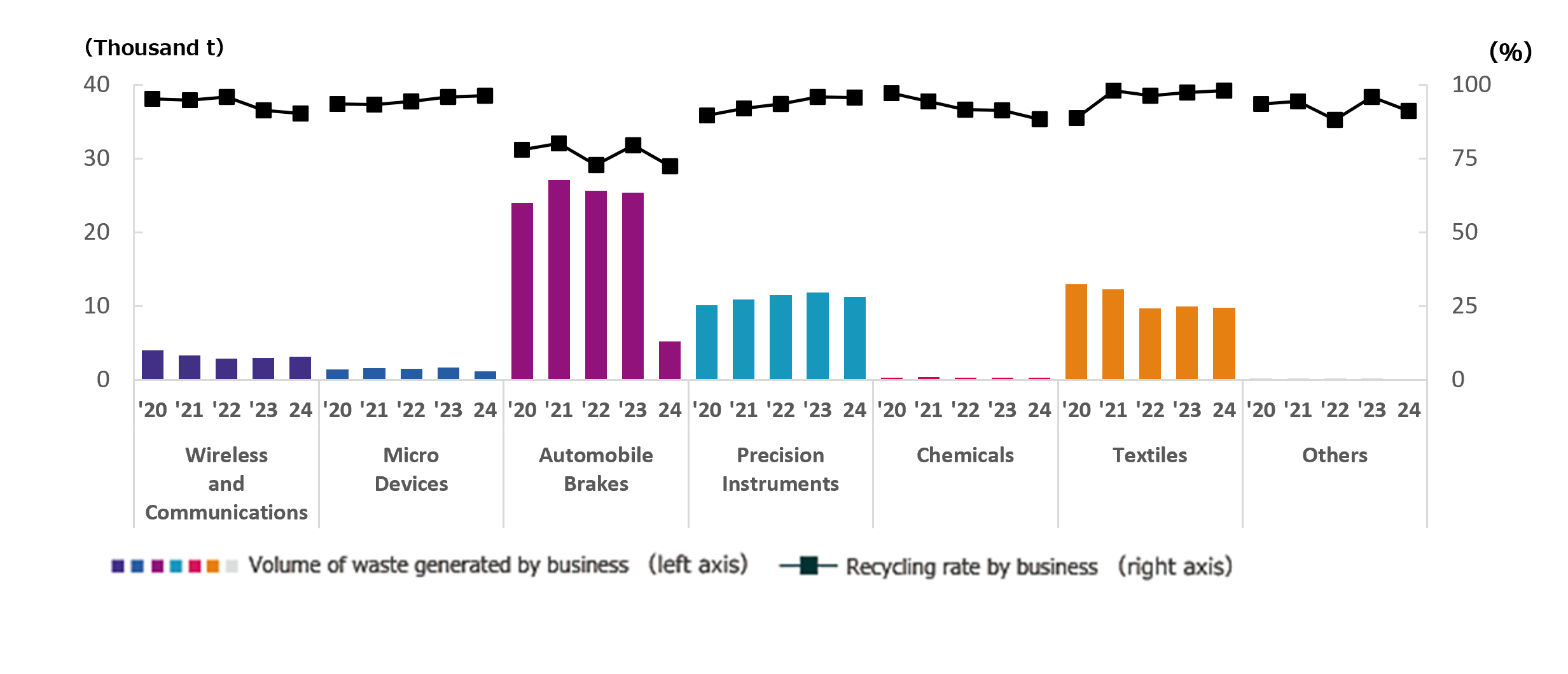
*1 Nisshinbo Holdings Inc. (the "Company") excluded TMD Group, which was a consolidated subsidiary, from the scope of consolidation, due to its transfer, which took place on November 30, 2023. As a result, data for TMD Group is included in the aggregation up to November 2023.
*2 On December 27, 2023, the Company included KOKUSAI DENKI Electric Group within its scope of consolidation, and data for the group is included from FY2024.
*3 On November 28, 2024, the Company included ARGONICS GmbH and ARGONAV GmbH within the scope of consolidation as subsidiaries in the Wireless and Communications business. However, data for these companies is not included in the FY2024 data.
Examples of Nisshinbo Group
Zero Emissions
Throughout the Nisshinbo Group, the Group is working toward zero emissions (a recycling ratio of 99% or more). Of its locations that generated 10 tons of waste or more in FY2024, 32 locations achieved zero emissions.
Sites that have Achieved Zero Emissions
- Nisshinbo Holdings Inc. R&D Center
- Japan Radio Co., Ltd. Nagano Plant
- Japan Radio Co., Ltd. Kanto Logistics Center
- Japan Radio Co., Ltd. Ueda Logistics Center
- Nippon Wireless Co., Ltd. Sanada Warehouse
- Nippon Wireless Co., Ltd. Tatsumi Office
- Japan Radio Co., Ltd. Hokkaido Branch
- Nippon Wireless Co., Ltd. Shizuoka Sales Office
- Nippon Wireless Glass Co., Ltd.
- JRC System Service Co., Ltd. Kyushu Branch
- Nagano Japan Radio Co., Ltd. Head Office & Factory
- Ueda Japan Radio Co., Ltd. Head Office & Main Factory
- JRC Tokki Co., Ltd. Main Plant
- NJ Components Co., Ltd. Sanyo Office
- Nisshinbo Micro Device Inc. Kawagoe Plant
- Nisshinbo Micro Device Inc. Yashiro Plant
- Nisshinbo Micro Devices Fukuoka Co., Ltd.
- Nisshinbo Brake Inc. Tatebayashi Plant
- Nisshinbo Mechatronics Inc. Miai Machinery Plant
- Nisshinbo Mechatronics Inc. Hamakita Seiki Plant
- Nisshinbo Mechatronics India Pvt. Ltd.
- NISSHINBO COMPREHENSIVE PRECISION MACHINING (GURGAON) PRIVATE LIMITED
- Nambu Kasei Co., Ltd. Head Office
- Nanbu Plastics Co., Ltd. Susono Plant
- Nanbu Plastics Co., Ltd. Oigawa Works
- Kyushu Nanbu Plastics Co., Ltd.
- Nisshinbo Chemical Inc. Chiba Plant
- Nisshinbo Chemical Inc. Tokushima Plant
- Nisshinbo Chemical Inc. Toke Development Center
- Nisshinbo Textile Inc. Tokushima Plant
- Nisshinbo Do Brasil Industria Textil LTDA.
- PT. Naigai Shirts Indonesia
Specific Activities of the Group Companies
Implementation of End-of-Life Battery Recycling
HYS Engineering Service Inc. is working to recycle used batteries. Until now, all but some of the used batteries (Pb, Li-ion and Ni-MH) sold to customers nationwide and taken back for replacement have been treated as industrial waste, but from the second half of FY2022, the entire company has started considering measures with the aim of recycling used batteries.
After formulating internal rules and concluding contracts with recycling treatment operators, a system has been established at branches and sales offices west of the Kanto-Koshinetsu region to secure the volume of materials through a patrol system for recycling treatment as valuable materials.
In addition, by adjusting the route of rounds, it is also possible to collect waste at the branches and sales offices, as well as at suppliers. The actual recycling volume was approximately 4 t in FY2022, 39 t in FY2023, 41 t in FY2024, and 32 t in the first quarter of FY2025.
As a maintenance service company, HYS Engineering Service Inc. will continue to promote these initiatives while also looking to expand the recycling of items other than used batteries in order to reduce waste emissions.
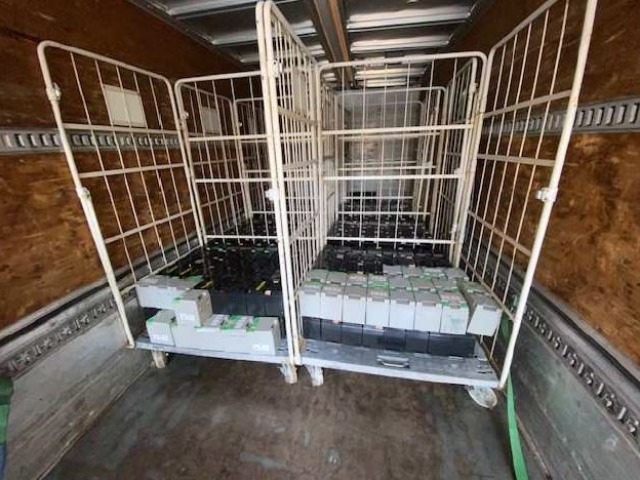
Reuse of Waste Plastic
Nisshinbo Mechatronics Inc. promotes the recycling of waste plastics as an effective use of resources.
In the manufacturing process of injection-molded products, many resins containing reinforcement materials, such as glass fibers, are used as materials. In-process defective products and unwanted resin parts generated during the molding process are separated by type and crushed for reuse as raw materials.
An additional crusher was installed in FY2024, enabling 102 t to be recycled per year, with the addition of another crusher in FY2025 expected to further increase the amount of material recycled.
In parallel with these activities, Nisshinbo Mechatronics Inc. is working for production activities that reduce waste by improving molds to minimize unnecessary resin during the molding process and promoting kaizen in the production process.
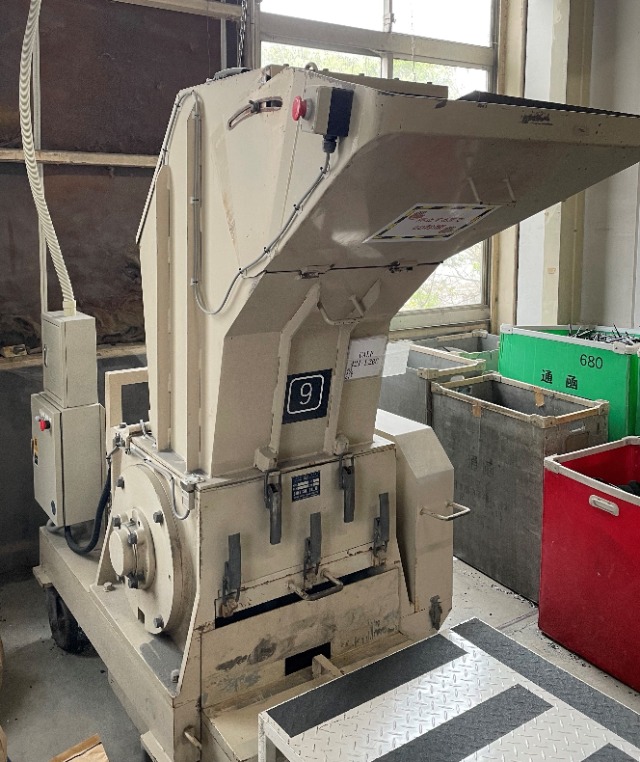
Recycling of Waste Plastic by Increasing the Number of Repellet Machines
Toms Manufacturing Corporation in the Philippines has purchased one used repellet machine and will have a fleet of three from 2024, thereby promoting the use of recycled materials.
Repellet refers to the crushing and melting of waste plastics, such as the runners generated during production to raw materials, which are then reused as recycled materials. In FY2024, 281 t/year of waste plastic was reused (13 t more than in FY2023). The amount of reused plastic is increasing, albeit gradually, every year.
The company will continue to promote recycling activities with the aim of achieving sustainable operations.
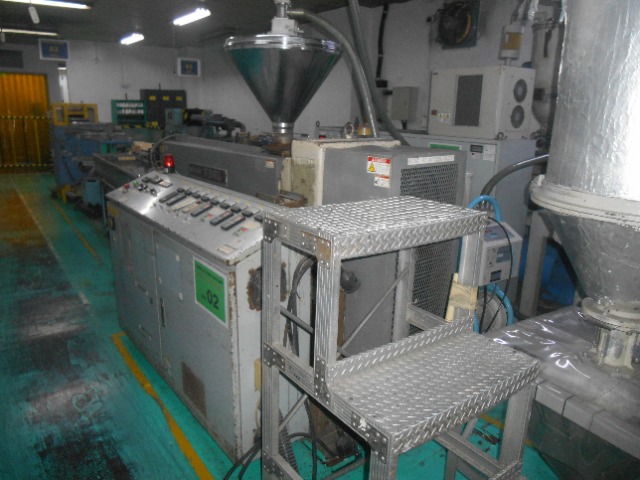
Promoting Paperless Reporting
Nisshin Environmental Planning Inc. analyses specimens requested by customers, prepares a report as a deliverable of the analysis results, and delivers the report with a seal.
In order to promote an environmentally friendly paperless system, Nisshin Environmental Planning Inc. has been proposing to customers to issue reports with electronic signatures using e-metrology, and the number of reports issued using e-metrology was 273 in FY2021, 725 in FY2022, 805 in FY2023 and 661 in FY2024 (equivalent to 9,750 sheets of paper).
The current annual paper consumption is approximately 330,000 sheets (in FY2024), so the reduction effect is still limited; however, e-metrology also has the advantage of reducing paper and document storage space, as well as reducing dispatch time and delivery times through delivery by e-mail.
Since electronic deliverables, such as e-metrology, are recognized and have become more widespread because of the social trend towards resource conservation, it is expected that the company and many other companies and institutions in the analysis industry, where paper has traditionally been the mainstay, will promote the use of electronic systems. The company will continue to promote paperless reporting with the understanding of its customers.
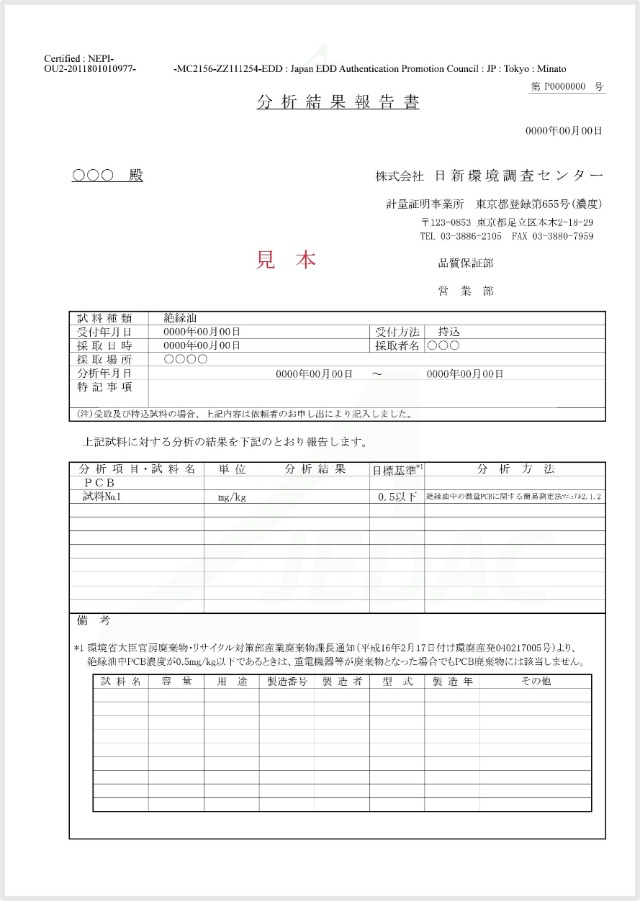
Continuation of Certification as a 3R Practice Business
At the Tokushima Plant of Nisshinbo Chemical Inc., Nisshinbo Textile Inc., Nisshinbo Chemical Inc., and Nisshinbo Holdings Inc. are working side by side in the 3R (Reduce: Reduce generation of waste, Reuse: Reuse, Recycle: Recycle) activities promoted by Tokushima Prefecture.
In the manufacturing process of CARBODILITETM at Nisshinbo Chemical, equipment had to be washed with organic solvents each time the product was manufactured, and the large volume of waste liquid generated was distilled and recycled by a recycling company.
By selecting and reusing less contaminated organic solvents for cleaning, the consumption of organic solvents could be reduced by more than 30%, and at the same time, the energy required for the regeneration process was also reduced.
These efforts resulted in the company being accredited by Tokushima Prefecture as a "Tokushima Prefecture-accredited 3R model business site" in March 2017. This is a system to certify establishments in Tokushima Prefecture that are actively working to promote the 3R of waste reduction, recycling, and re-use of recyclable resources and are achieving significant results. The company undergoes a renewal review every three years and is certified until March 2026.
Pre-consumer - Recycling and Biomass Feedstock
The Tokushima Plant of Nisshinbo Textile obtained GRS certification for the production and sales process of the polyurethane product Mobilon.
GRS stands for Global Recycled Standard, an international certification system for products containing more than 20% recycled materials. In general, polyurethane products use many chemicals in the raw materials and manufacturing processes, so meeting the regulatory requirements of the GRS is considered a very high hurdle, but the company has cleared this strict standard.
The company also obtained OK biobased (class 1) certification for Mobilon yarn (ether and ester types) and Mobilon tape. This certification validates the extent to which plant-derived (biomass) materials are used. Class 1 is for products with a biobased carbon content of at least 20%.
Certification is only a passing point. We will continue to implement environmentally friendly and sustainable initiatives, such as pre-consumer recycling (reuse of unused products) of non-standardized products generated in the manufacturing process, and the use of biomass materials.
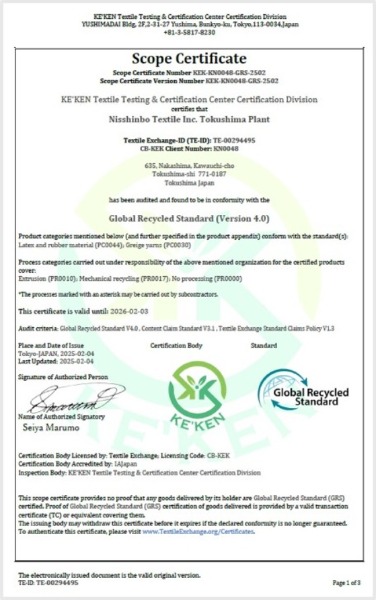
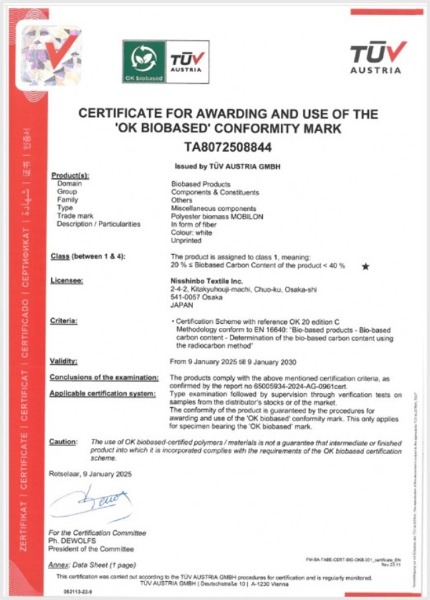
Unwanted Shirt Collection Campaign
NISSHINTOA IWAO INC. has been a member of Upcycle, a general incorporated association, since its establishment in 2023, in which companies from across industries work together to develop new initiatives that extend beyond the boundaries of conventional recycling.
As of 2024, 48 companies and organizations are participating in Upcycle. The aim is to promote the improvement of recycling rates for resources and food residues and to create new value.
The first project, TSUMUGI, launched at the time of its establishment, is an initiative to transform used paper resources and thinned wood from forest maintenance into paper yarn. In July, the project was exhibited at Japan Expo in Paris.
In 2024, as the second phase of the project, the Enz Koji project was launched to upcycle food byproducts as koji using the solid culture technology of member companies. Under this project, koji is made from food byproducts and the dregs that would normally be discarded, and bread made from this koji is sold in limited quantities at Nescafe's Harajuku shop.
In April 2025, a directly managed Tsumugi shop was opened in Aizu Wakamatsu City, where, in addition to product sales, the company offers weaving experiences on a loom and spinning yarn and hands-on content, such as herb dyeing and Aizu molds.
